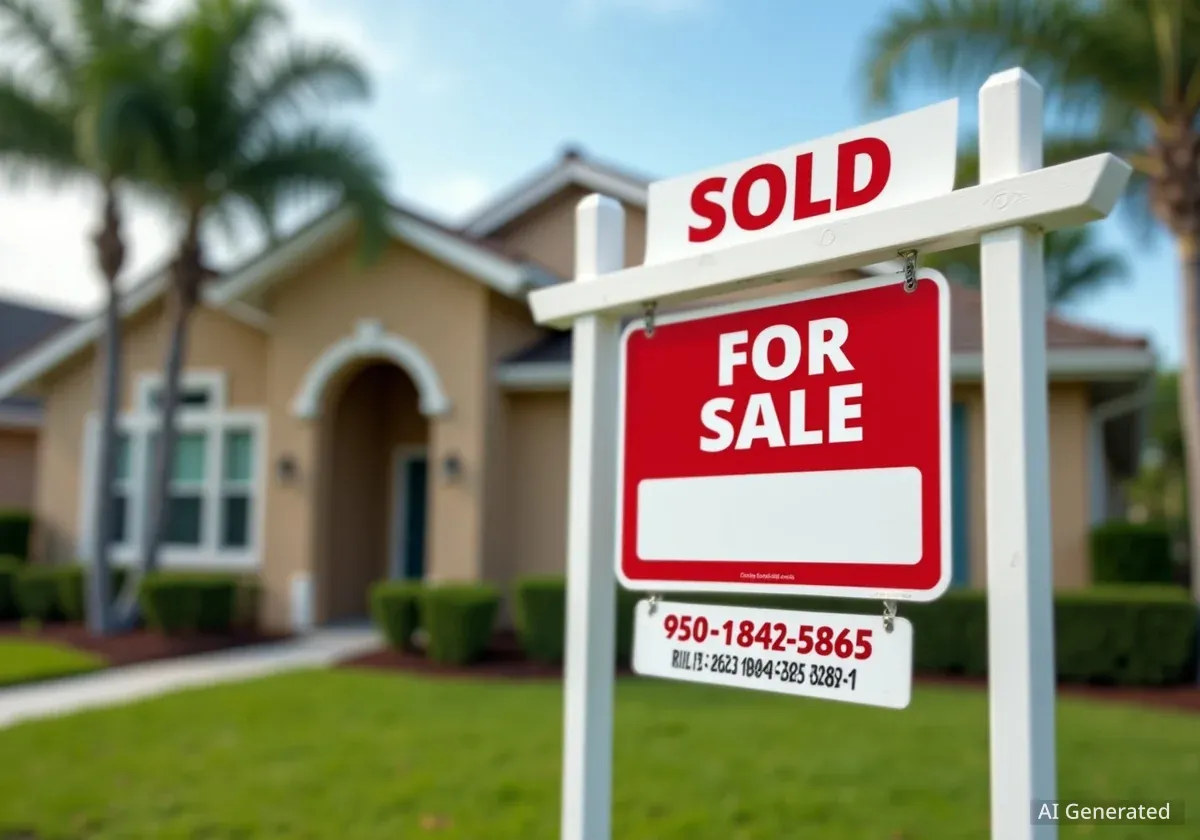The U.S. Federal Reserve has implemented a quarter-point interest rate reduction, its first since last December. The move is generating cautious optimism among real estate professionals in Cape Coral, Florida, who hope the decision will help stimulate a local housing market that has experienced a significant slowdown from its pandemic-era peak.
Local brokers and real estate agents report that while the cut is a positive signal, underlying issues such as housing affordability, elevated insurance costs, and high inventory levels remain significant challenges for buyers and sellers in Southwest Florida.
Key Takeaways
- The Federal Reserve announced a 0.25% reduction in its key interest rate.
- Cape Coral's housing market has slowed, with homes now on the market for an average of 107 days.
- Housing inventory in Cape Coral has returned to pre-pandemic levels, with over 3,000 homes listed for sale.
- Local experts believe multiple rate cuts over an extended period are needed to significantly impact affordability.
- Despite the rate cut, a nationwide housing shortage and stabilizing insurance rates present a complex market picture.
Federal Reserve Implements Key Rate Reduction
On Wednesday, Federal Reserve Chair Jerome Powell confirmed the central bank's decision to lower its benchmark lending rate by a quarter of a percentage point. This marks the first such reduction since December and aligns with market expectations for a shift in monetary policy amid signs of a cooling economy.
While the Federal Reserve's actions do not directly dictate mortgage rates, they heavily influence them. Powell acknowledged this connection, stating, "We don't set mortgage rates, but our policy rate changes do tend to affect mortgage rates."
The decision comes as national economic indicators show signs of slowing. According to the U.S. Bureau of Labor Statistics, the unemployment rate rose to 4.3% in August, its highest point since 2021. The same report indicated that job growth has also decelerated, contributing to a broader picture of economic stagnation.
"They [the Fed] are moving in the right direction, downward now," said Tony Lee, owner of Edison Mortgage, Inc. in Cape Coral, expressing a sentiment shared by many in the local industry.
Southwest Florida's Housing Market Cools
The rate cut is particularly relevant for markets like Southwest Florida, which saw extraordinary growth during the pandemic. That rapid expansion has now given way to a more sluggish environment. In Lee County, the average time a home spends on the market has increased to 107 days, nearly a month longer than the previous year, according to data from Realtor.com.
Nathaniel Hajjami, a Cape Coral realtor, confirmed the slowdown in sales activity. "Sales have definitely slowed down," he noted, explaining that many potential buyers have adopted a wait-and-see approach. "There's a lot of people that I've been working with that decided, let's wait and see what happens."
Cape Coral Inventory Rebounds
The number of single-family homes for sale in Cape Coral has surpassed 3,000, according to MLS.com data. Local real estate professionals report this figure brings the city's housing inventory back to levels seen before the pandemic buying surge.
This increase in available homes contrasts sharply with the high-demand, low-supply market of recent years, shifting negotiating power and putting pressure on sellers to adjust their expectations.
Affordability Remains a Central Issue
Despite the market slowdown, affordability continues to be a major hurdle for many prospective homebuyers. A combination of factors, including elevated home prices, rising insurance premiums, and previously high interest rates, has kept many people on the sidelines.
Tony Lee pointed out that some sellers have been slow to adapt to the new market reality. "They still think the house might be the 2022 price, when it's not," he said, highlighting a disconnect between seller expectations and current market values.
Price Adjustments Across the Region
Home prices have begun to decline in Southwest Florida. The median sale price for a home in Lee County was $355,000 in August, down from $375,000 in August of the previous year. A recent Consumer Affairs report also identified nearby North Port as having the most significant home price drop in the country over the past year.
Lee noted some positive developments, particularly with insurance. "Insurance has kind of stabilized a little bit, we're getting some new carriers coming into the state of Florida," he explained. "So we are starting to see a little bit more competitive pricing there, which is good."
Outlook for the Cape Coral Market
While the single quarter-point cut is welcomed, local experts caution that it is not a quick fix. Both Lee and Hajjami agree that a sustained period of rate reductions would be necessary to make a meaningful difference in home affordability.
Lee suggested it could take more than a year and additional rate cuts before significant effects are felt by the average buyer. However, the Federal Reserve's signaling of a potential for future cuts has provided a sense of optimism.
Federal Reserve Chair Jerome Powell also contextualized the situation by pointing to a larger, structural issue. He noted there is a "nationwide housing shortage," which he described as a deeper problem that monetary policy alone cannot solve. This underlying lack of supply could continue to support price levels even as interest rates fall.
For now, the Cape Coral real estate community is watching closely, hopeful that this is the first step toward a more balanced and accessible market. As Lee summarized, "There's more good news to come."




